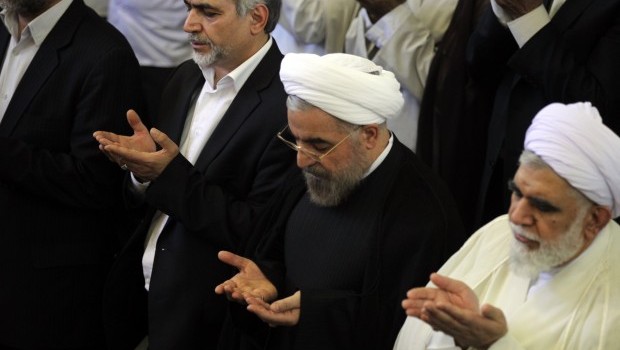
Iranian president-elect Hassan Rouhani (C) attends the weekly Friday prayer with Shi’ite Muslim worshippers during the Muslim fasting month of Ramadan on July 12, 2013, at the university of the Iranian capital, Tehran. (AFP PHOTO/ATTA KENARE)
The head of the Iranian parliament’s Department of Protocol, Mohammad Yasrebi, told reporters on Sunday: “[The] presidents of Afghanistan, Armenia, Guinea-Bissau, Kyrgyzstan, Lebanon, North Korea, Pakistan, Tajikistan, Turkmenistan and Togo have confirmed their attendance.”
A number of other countries have confirmed they would send prime ministers, parliamentary speakers, vice presidents and deputy foreign ministers to the inauguration.
Adnan Mahmoud, the Syrian ambassador to Tehran, announced the country’s prime minister, Wael Nader Al-Halqi, will participate in the ceremony. Russia, Algeria, Azerbaijan, Congo and Oman will send their parliamentary speakers. Malaysia will send its former prime minister, Mahathir Mohamad.
Yasrebi also said the deputy secretary-general of the United Nations, Jan Eliasson, will attend the event.
Many analysts are suggesting that Iran’s decision to invite world leaders to the upcoming presidential inauguration ceremony, previously a more low-key event, is part of an attempt to improve relations with the West.
This speculation has coincided with claims that Iran is seeking to initiate direct negotiations with the US.
A report in the New York Times, published on July 26, says that Iraqi prime minister Nuri Al-Maliki had told American officials this month that Iran was interested in direct talks with the United States on its nuclear energy program.
However, Iranian foreign ministry spokesman Abbas Araqchi rejected claims that Tehran was interested in engaging in direct talks with Washington over the country’s nuclear program.
“The Islamic Republic of Iran has not requested direct talks with the US,” Araqchi said on Saturday.
While the list of foreign guests at Rouhani’s forthcoming inauguration has occupied the attention of the international media, in Iran a dispute has arisen over the invitation of former president Mohammad Khatami to the ceremony.
Khatami’s invitation has been met with both approval and anger among Iranian MPs, with members of the conservative camp expressing their disapproval at the presence of the Khatami, a prominent reformist, over his support from the Green Movement after the controversial, disputed presidential election of 2009.
However, Iranian lawmaker Esmail Jalili said those MPs expressing strong opinions on the matter were a “minority within the parliament,” and told the Shargh newspaper that “there is a minority in the parliament who do not approve Mr Khatami’s presence at the inauguration ceremony.”
“Truly, the majority of the parliament is in favor of all former presidents [attending] the inauguration ceremony. That would include Khatami and Ahmadinejad also,” Jalili added.
The guests will be attending Rouhani’s swearing-in on August 4 at 4 p.m. local time. He will be formally endorsed one day earlier, on August 3, by the country’s head of state, the supreme leader of the Islamic Republic of Iran, Ayatollah Ali Khamenei.

Trackbacks/Pingbacks